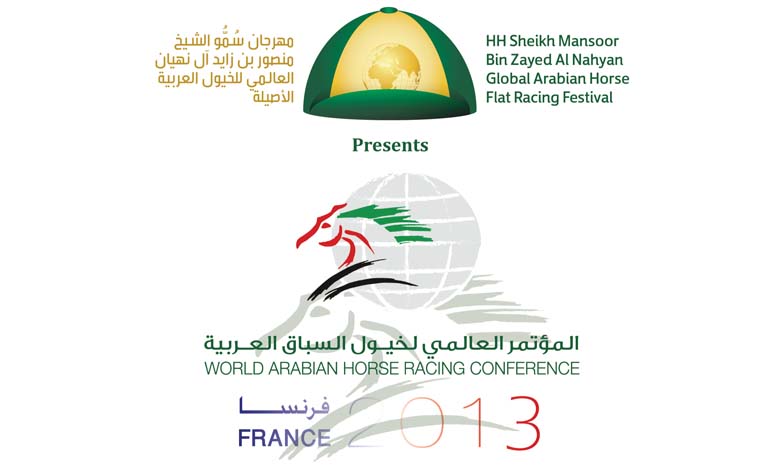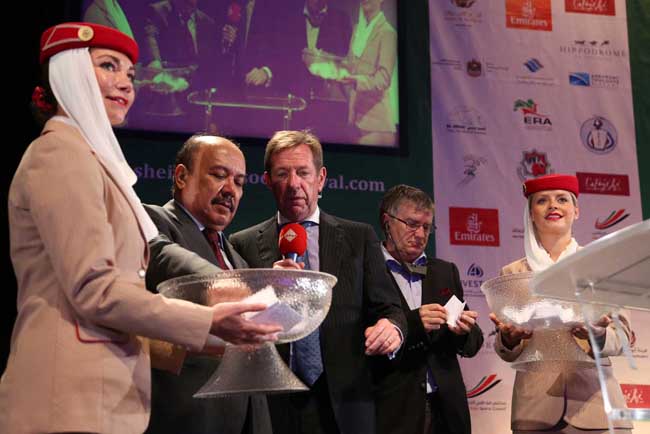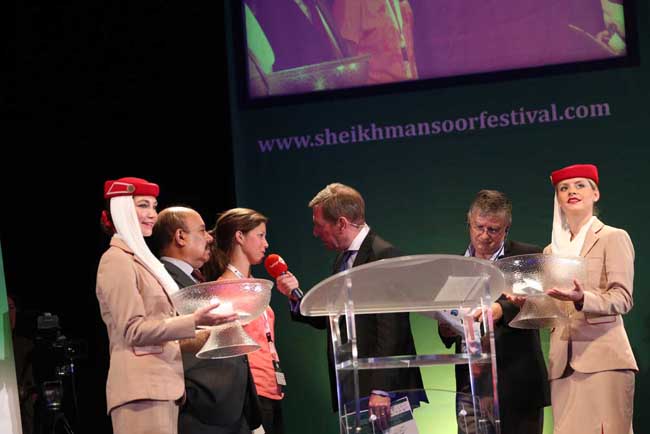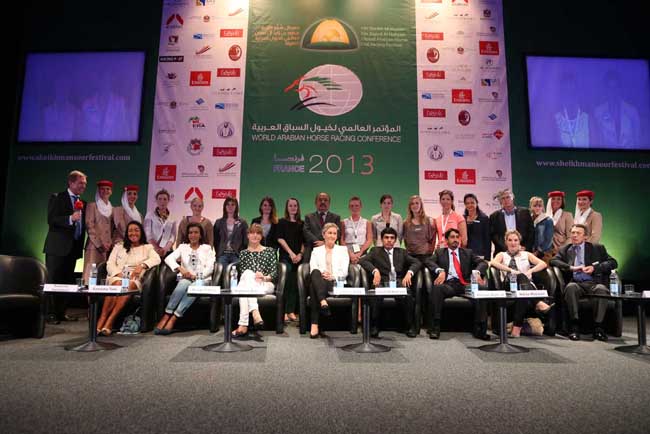|
UAE envoy to Poland conducts draw for HH Sheikha Fatima race Jockeys share their passion, problems at World Arabian Horse Racing Conference in Toulouse The second day of the fourth edition of the World Arabian Racing Conference 2013 began at the Centre de Congrès Pierre Baudis in Toulouse with jockeys revealing their reasons for them taking to the profession. Soon after the session, His Excellency Asim Mirza Al Rahma, the UAE Ambassador to the Republic of Poland along with Jerome Rambaud, Head of Toulouse Racecourse picked the draw for the lady jockeys for Sunday’s HH Sheikha Fatima bint Mubarak Ladies World Championship (IFAHR) race. Noted race commentator Derek Thompson conducted the draw and introduced the lady jockeys to the conference attendees which included over 75 journalists.
Ms Lara Sawaya, Director of HH Sheikh Mansoor Bin Zayed Al Nahyan Global Arabian Horse Flat Racing Festival and Head of International Federation of Arabian Horse Racing Authorities (IFAHR) Ladies said that for the first time 16 lady jockeys will be starting in Sunday’s race. “Usually it is 12 but since France has a number of lady jockeys we decided to have a full field of 16 jockeys. We are looking forward to a great race,” she said. Earlier in the morning, the moderator was Susanna Santesson from Germany as the amateur and professional jockeys spoke of the challenges, shortfalls and passion of being a jockey. Saleema Taleei of Oman said, “The difficulties are countless. I’m a sportswoman. I have played football but racing was the biggest challenge for me. The big question is how to know your horse and makes the horse know you.” “Some trainers prefer to see women riding their horses rather than to be ridden by a male jockey. Horses too sometimes like women jockeys. I have ridden a winner in Group-3 and the same horse did not win under a male jockey,” said Taleei, who races in the UAE. Duygu Fatura (Turkey) said, “It was a dream to become a jockey in a society where there’s no big room for women to ride horses. I have started as amateur and after thirty years since I was seven years old, I’m a jockey right now.” French lady jockey Delphine Dubois said, “Women jockeys are doing very well in France and a trainer like Andre Fabre is using them. In France there’s every chance for every jockey to prove themselves whether male or female.”
“The real challenge is not to lose a race which you could win. Trainers do not have enough time to look after the jockeys. They are busy with their horses and the jockeys have to look after themselves. A good jockey (man or woman) is a product of talent and hard work,” Dubois said. Norwegian Veronika Aske said, “We race once a week for the amateur jockeys, but it is difficult to be ready at all times to take part. It’s not easy to combine two jobs at the same time which make it very difficult for me as an amateur rider. I was lucky because right from the beginning I have received the assistance of a good trainer who taught me how to ride.” Emirati Saeed Al Mazrouei said, “I have started well. I have joined a number of training schools in Ireland and it was my desire to become a jockey. I have faced some difficulties and I had to work hard. My boss is helping me and I’m riding winners in UAE.” “I have raced in four countries. Two months ago I rode a winner in Oman. I’m in great love with the Arabian horse and the big challenge for me is to fly UAE flag rather than to win as a jockey. My best experience was in South Africa. There are many good jockeys and the better jockey is the one who makes fewer mistakes,” Al Mazrouei said. The UAE’s top jockey, Ahmed Aljtebi said, “I have shifted from camel races to horse races and I was lucky enough to train in Ireland, South Africa and Australia. And when you ride a winner in your country you will never give up again.” “Some horses need a woman touch. Women have better emotions than us. It was a great honour for me to fly my country’s flag in US and elsewhere because I’m not riding on behalf of myself as a professional jockey, but as a UAE sportsman.”
“I was exposed to different styles and schools of riding and racing. It’s not a game. It’s a profession. The job of the jockey is to give his horse every chance to win. It’s still premature to think of any future plans. And if you are looking for an answer, I will think of training,” said Ajtebi. Nikita McLean (Australia) said “It’s not a matter of strength. It’s a matter of fitness and talent. At some stage I hoped if I was a man to prove myself, but with hard work I was able to erase the differences between men and women. We are lucky in Australia to have a good training school for amateur riders.” Robert Litt (France) said he loves horses and he went to Chantilly and started as an apprentice. “I did well but my boss retired and I was forced to go to Toulouse and work there before pulling out due to overweight. Then I have started with Arabian horse riding and with the increase in the numbers of races I have established a new relationship with this dynasty. I believe the numbers of women jockeys are on the rise. Some of them are talented and find acceptance and support.” Earlier on Thursday afternoon two very interesting and educative sessions were held, one on Vetting and Nutrition and the other on Racing and Training. Liz Price from the UK took charge of the Vetting and Nutrition session and the speakers were, Dr Gonzalo Aebornoz (Argentine), Dr Sefian Alami (Morocco), Dr Robert La Caze (FR), Dr Frank Penide (FR), Mariam Al Shenazi (UAE), Dr Gulsah Kaya Kanasi (Turkey), Dr Andrew Dalgleish (Scotland) and Dr Mohammed Al Machmoum (Morocco). Patrick Buckley was the moderator for the Racing and Training session and the participants who shared their experience and expertise were Georgina Ward (UK/ Oman), Jean Francois Bernard (FR), Jerome Rambaud (FR), Stephen Higgins (UK), Ernest Ortel (South Africa), Karen Karin Van Den Bos (Holland), Sultan Khalifa (UAE), Gillian Duffield (UK) and Faysal Al Rahmani (UAE). All guests and officials later attended a grand welcome party on Thursday, June 6, night. The HH Sheikh Mansoor Bin Zayed Al Nahyan Global Arabian Horse Flat Racing Festival is organized by the Abu Dhabi Tourism and Culture Authority and co-ordinated by Abu Dhabi Sports Council in association with Emirates Racing Authority, IFAHR and Emirates Arabian Horse Society, supported by General Authority for Youth and Sports Welfare and Fegentri with Emirates airlines as the official carrier and sponsored by Invest AD Arabtec Holding PJSC, Al Rashid Investment, Areej Al Ameerat, Al Awani General Enterprises, Kabale, Al Wathba Centre, the UAE's General Women's Union, the HH Sheikha Fatima bint Mubarak Ladies Sports Academy, Abu Dhabi International Hunting and Equestrian Exhibition 2013, Dr. Nader Saab Switzerland, Wathba Stud Farm, Al Wathba Center, Abu Dhabi Equestrian Club, Eastern Mangroves Hotel and SPA and Eastern Mangroves Suites-Abu Dhabi by Jannah, Galleries Lafayette and Toulouse Airport. |
Enduroonline.com.br
- © Copyright 2008 - Todos os direitos reservados. |



